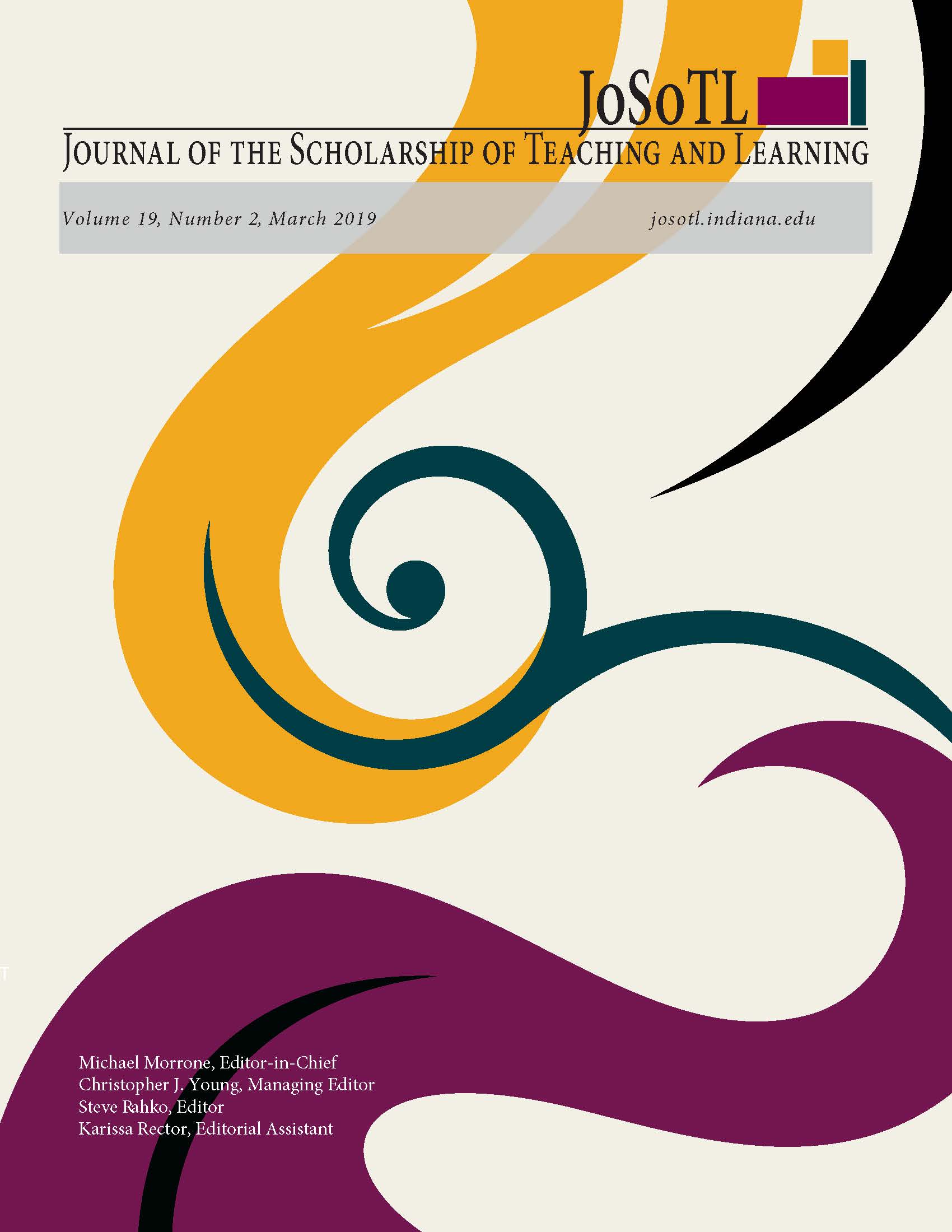Toward Hybridity: The Interplay of Technology, Pedagogy, and Content across Disciplines at a Small Liberal Arts College
Main Article Content
Abstract
Through semi-structured interviews with sixteen faculty members representing a variety of experience levels and departments, this piece illuminates faculty theories and ideas about digital pedagogy through the conceptual lens of TPACK (Mishra & Koehler, 2006), which delineates the overlapping considerations teachers in designing learning through technological knowledge, pedagogical knowledge, content knowledge. Findings reveal widespread similarities in attitudes toward teaching and learning across all different departments and indicate that, while faculty members had a range of content knowledge, pedagogical knowledge, and technological knowledge inferences, the greatest tensions and successes were articulated when faculty discussed issues located at the nexus of technological knowledge, content knowledge, and pedagogical knowledge.
Downloads
Article Details
- Authors retain copyright and grant the Journal of the Scholarship of Teaching and Learning (JoSoTL) right of first publication with the work simultaneously licensed under a Creative Commons Attribution License, (CC-BY) 4.0 International, allowing others to share the work with proper acknowledgement and citation of the work's authorship and initial publication in the Journal of the Scholarship of Teaching and Learning.
- Authors are able to enter separate, additional contractual agreements for the non-exclusive distribution of the journal's published version of the work (e.g., post it to an institutional repository or publish it in a book), with an acknowledgement of its initial publication in the Journal of the Scholarship of Teaching and Learning.
- In pursuit of manuscripts of the highest quality, multiple opportunities for mentoring, and greater reach and citation of JoSoTL publications, JoSoTL encourages authors to share their drafts to seek feedback from relevant communities unless the manuscript is already under review or in the publication queue after being accepted. In other words, to be eligible for publication in JoSoTL, manuscripts should not be shared publicly (e.g., online), while under review (after being initially submitted, or after being revised and resubmitted for reconsideration), or upon notice of acceptance and before publication. Once published, authors are strongly encouraged to share the published version widely, with an acknowledgement of its initial publication in the Journal of the Scholarship of Teaching and Learning.
References
Anders, P. L., Yaden Jr, D. B., Da Silva Iddings, A. C., Katz, L., & Rogers, T. (2016). Entanglements, Intensities, and Becoming: Non-Representational Perspectives on Literacy Research. Journal of Literacy Research. 48(1). 3-4.
Angeli, C., Valanides, N., & Christodoulou, A. (2016). Theoretical Considerations of Technological Pedagogical Content Knowledge. Handbook of Technological Pedagogical Content Knowledge (TPACK) for Educators, 2nd Ed. 11-32.
Barnard, S. (2015 Sept). Building castles in the air: Critical digital pedagogy and the pursuit of praxis. Hybrid Pedagogy. Retrieved from http://www.digitalpedagogylab.com/hybridped/buildingcastles-in-the-air-critical-digital-pedagogy-and-the-pursuit-of-praxis/
Breneman, D. W. (2010). Liberal arts colleges: Thriving, surviving, or endangered?. Brookings Institution Press
Brown, D., & Warschauer, M. (2006). From the university to the elementary classroom: students’ experiences in learning to integrate technology in instruction. Journal of Technology and Teacher Education, 14(3), 599–621.
Clark, B. R. (1992). The Distinctive College. Transaction Publishers, Department NRB93HE, Rutgers-The State University of New Jersey, New Brunswick, NJ 08903.
Corbin, J., & Strauss, A. (2008). Basics of Qualitative Research: Techniques and Procedures for Developing Grounded Theory (3rd ed.).Thousand Oaks, CA: Sage.
Ertmer, P. A. (2005). Teacher pedagogical beliefs: The final frontier in our quest for technology integration?. Educational technology research and development, 53(4), 25-39.
Ertmer, P. A., & Ottenbreit-Leftwich, A. T. (2010). Teacher technology change: How knowledge, confidence, beliefs, and culture intersect. Journal of research on Technology in Education, 42(3), 255-284.
Fairchild, J., Meiners, E. B., & Violette, J. (2016). “I Tolerate Technology—I Don't Embrace It”: Instructor Surprise and Sensemaking in a Technology-Rich Learning Environment. Journal of the Scholarship of Teaching and Learning, 16(4), 92-108.
Gee, J. P. (2014). An introduction to discourse analysis: Theory and method. Routledge.
Husbye, N. E., Buchholz, B., Coggin, L. S., Powell, C. W., & Wohlwend, K. E. (2012). Critical lessons and playful literacies: Digital media in PK-2 classrooms. Language Arts, 90(2), 82-92.
Ito, M., Gutiérrez, K., Livingstone, S., Penuel, B., Rhodes, J., Salen, K., ... & Watkins, S. C. (2013). Connected learning: An agenda for research and design. BookBaby.
Jewitt, C. (2008). Multimodality and literacy in school classrooms. Review of research in education, 32(1), 241-267.
Lohnes, S., & Kinzer, C. (2007). Questioning assumptions about students' expectations for technology in college classrooms. Innovate: Journal of Online Education, 3(5), 2.
McQuiggan, C. A. (2007). The role of faculty development in online teaching’s potential to question teaching beliefs and assumptions. Online Journal of Distance Learning Administration, 10(3), 1-13.
Mishra, P., & Koehler, M. J. (2006). Technological pedagogical content knowledge: A framework for teacher knowledge. Teachers college record, 108(6), 1017.
Morris, S. (2017 May) Critical digital pedagogy and design. Retrieved from http://seanmichaelmorris.com/critical-digital-pedagogy-and-design/
Pajares, M. F. (1992). Teachers’ beliefs and educational research: Cleaning up a messy construct.
Review of educational research, 62(3), 307-332.
Pittman, K. J., Irby, M., Yohalem, N., & Wilson‐Ahlstrom, A. (2004). Blurring the lines for learning: The role of out‐of‐school programs as complements to formal learning. New Directions for Student Leadership, 2004(101), 19-41.
Rorabaugh, P. & Stommel, J. (2012 June 13). Hybridity, Pt 3: What does hybrid pedagogy do?. Retrieved from http://www.digitalpedagogylab.com/hybridped/hybridity-pt-3-what- doeshybrid-pedagogy-do/. Hybrid Pedagogy.
Saldaña, J. (2015). The coding manual for qualitative researchers. Sage.
Spodark, E. (2003). Five obstacles to technology integration at a small liberal arts university. THE Journal (Technological Horizons In Education), 30(8), 14.
Umbach, P. D., & Kuh, G. D. (2006). Student experiences with diversity at liberal arts colleges: Another claim for distinctiveness. The Journal of Higher Education, 77(1), 169-192.
Umbach, P. D., & Wawrzynski, M. R. (2005). Faculty do matter: The role of college faculty in student learning and engagement. Research in Higher Education, 46(2), 153-184.
Zhang, J. (2010). Technology-supported learning innovation in cultural contexts. Educational Technology Research and Development, 58(2), 229-243.
